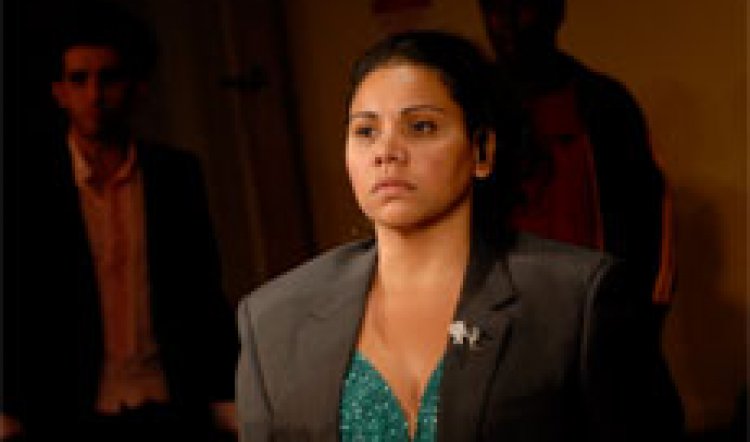
Antigone – the Burial at Thebes
Antigone – the Burial at Thebes, Belvoir St Theatre, April 5-May 25; ph: (612) 9699 3444 or www.belvoir.com.au
This version of Sophocles’ play, by Seamus Heaney, directed by Chris Kohn ( The Black Swan of Trespass and The Eisteddfod) has everything going for it, in theory. It brings the popular and excellent Deborah Mailman back to the main stage and also – unexpectedly – Paul Blackwell, long-time Adelaide resident now rarely seen in Sydney. He is one of Australia’s finest clowns and dramatic actorsand was most recently in Andrew Bovell’s The Day The Rain Stopped Falling (Adelaide Festival, see the review archived here on
Stagenoise).
Quite frankly then, what went so horribly wrong? And it does go wrong: very quickly. But then it drags on for an hour and a half that do not pass quickly at all. The core problem is a silly reworking/translation which is either the great Heaney on a bad day or which has been mucked about with subsequent to his efforts. How else to explain the misplaced amusements and wrong notes which cause an audience to snigger and chuckle (with some relief) at all the wrong moments?
Add to that a casting clunker of considerable proportions (Boris Radmilovich as King Creon) and a disappointing (at best) and excruciating (at worst) night in the theatre soon becomes a grim inevitability.
First of all, however, the soundscape by Jethro Woodward is exceptional: almost subliminal most of the time, it rises and falls as a series of musical-found sound elements that seem almost accidental or imagined and is as effective as much else on stage is not.
The set (and costumes) by Dale Ferguson with lighting by Luiz Pampolha provoked more questions and hot debate in the post-show foyer than virtually any other aspect of the production. What was it supposed to be? A rundown rural community hall? A school auditorium? A seedy RSL? Or maybe a down-at-heel Hellenic club somewhere in the deepest ’burbs?

The last guess won most votes (flickering fluoro lighting, ghastly paint job, a stage with red curtains, prominent ventilation ducts) but it needed a set dresser to focus the picture: some plastic gladdies in an urn, left-over paper decorations from a long-gone celebration; perhaps a Greek flag or something similar to anchor the room in a reality beyond a design idea. Whatever, it proved to be more distracting than setting.
Nevertheless, despite the play’s title, it is Creon who occupies the stage almost constantly and on whose performance the play pivots. And Radmilovich’s gruesome performance as the king sank the show almost as surely as Kormoran got the Sydney. His CV suggests an actor and director of considerable experience and talent (from Sarajevo to WAAPA in Perth where he is a lecturer and director; his acting credits are also extensive) so why he seems to be so at sea with Creon is puzzling. It is a performance without conviction, understanding, light, shade or depth; there is a lot of shouting and precious little else.
If Paul Blackwell had been called in at the last minute to take on the role of the king (rather than the narrator known as Chorus) it might have been different. Even in that unforgiving role of expositional onlooker he brings humanity and nuance to a recognisable human being.
Antigone is, in this “version” at least, also an unforgiving piece. The melodramatics have no foundation in contemporary life despite the clear analogies and universalities; and the often jarring leaps into modern colloquial/slang simply provoke giggles and fatal dislocation of the audience. Against these odds the cast make the best of a difficult job. Hazem Shammas as Creon’s remaining son Haemon, Katie Fitchett as Antigone’s less courageous sister Ismene and Pacharo Mzembe as the Guard are valiant in the face of impossibility; while Gillian Jones is in a class of her own in the dual roles of the blind seer Tiresias and mourning queen Eurydice.
Mailman’s Antigone has little chance, in stage time or the role itself, but acquits herself well and honestly in the circumstances. The circumstances, however, are about as tragic, stirring and world-turning as a particularly fractious AGM of the Thebes RSL. It is impossible to see how this telling of the story would have lasted and come down to us over the millennia. It’s an hour and a half straight through and that’s a small mercy.



